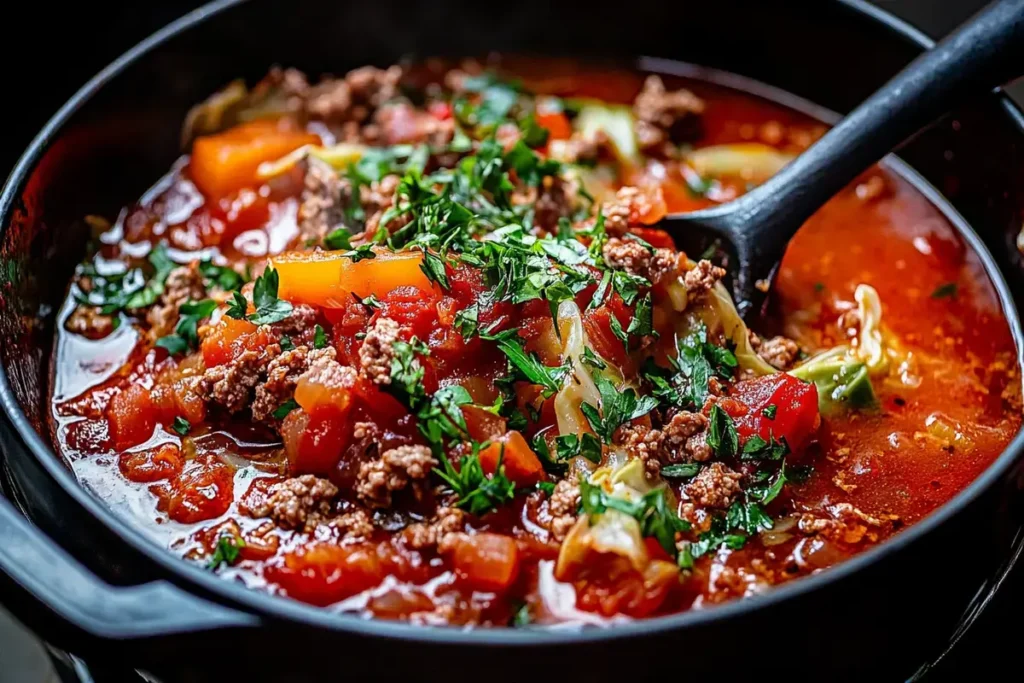Let me be upfront with you as a professional chef who’s spent years developing nutritious recipes in my Seattle kitchen, I’ve watched countless food trends come and go. The cabbage soup diet remains one of the most requested topics on BoldyRecipes.com, so today I’m giving you the honest facts about what this restrictive diet can and cannot do for weight loss.
The Numbers: Realistic Weight Loss Expectations
The cabbage soup diet typically promises 10-15 pounds of weight loss in just seven days. From my experience coaching clients through various eating plans, most people realistically lose between 5-10 pounds during the week, with some reporting up to 12 pounds. However, here’s the crucial truth many diet promoters won’t tell you: the majority of this weight is water weight and muscle mass, not fat.
When you drastically reduce calories , the cabbage soup diet provides only 800-1,000 calories daily compared to the recommended 1,500-2,000 , your body first depletes glycogen stores. Each gram of glycogen holds 3-4 grams of water, which explains the dramatic initial drop on the scale. True fat loss during this week is typically only 1-3 pounds at most.

Understanding the Seven-Day Protocol
The traditional cabbage soup diet follows a strict daily schedule. You consume unlimited amounts of cabbage soup (made with cabbage, onions, celery, tomatoes, and bell peppers) plus specific foods each day:
Day 1: Soup plus fruits (except bananas)
Day 2: Soup plus vegetables
Day 3: Soup plus fruits and vegetables
Day 4: Soup plus bananas and skim milk
Day 5: Soup plus beef and tomatoes
Day 6: Soup plus beef and vegetables
Day 7: Soup plus brown rice and vegetables
This rotation supposedly “tricks” your metabolism, though scientific evidence supporting this claim is limited.
The Science Behind Rapid Weight Loss
The dramatic calorie deficit forces your body into a state of semi-starvation. Your metabolism actually slows down by 20-30% to conserve energy, which is why many people experience fatigue, dizziness, and difficulty concentrating by day three or four.
As a culinary professional who values both flavor and nutrition, I’ve observed that the monotony of eating primarily cabbage soup often leads to intense food cravings. The diet’s extremely low protein content (except on meat days) can result in muscle loss, which further slows metabolism long-term.
Geographic and Cultural Considerations
Here in the Pacific Northwest, where farm-to-table eating and sustainable nutrition are prioritized, extreme diets like this are generally viewed skeptically by healthcare professionals. Local nutritionists I’ve collaborated with in Portland and Seattle consistently warn against very low-calorie diets lasting more than a few days without medical supervision.
The diet’s popularity varies significantly across America. Southern states report higher interest during pre-summer months, while it sees year-round searches in metropolitan areas like Los Angeles and New York, where quick-fix solutions often gain traction.

Health Implications and Safety Concerns
The rapid weight loss can cause several side effects:
- Severe headaches from sudden caffeine withdrawal
- Weakness and lightheadedness from low blood sugar
- Digestive issues from high fiber intake
- Nutrient deficiencies, particularly in iron and B vitamins
- Gallstone formation in susceptible individuals
Most concerning is the inevitable weight regain. Studies show that 95% of people regain all lost weight within two weeks of resuming normal eating, often gaining additional pounds due to metabolic slowdown.
My Professional Recommendation
After 18 years in professional kitchens and nutrition consulting, I advocate for sustainable approaches instead. If you’re determined to try the cabbage soup diet, limit it to 3-4 days maximum as a “reset” rather than a weight-loss solution. Use it to break unhealthy eating patterns or reduce bloating before an event.
For lasting weight loss, aim for 1-2 pounds weekly through a balanced deficit of 500-750 calories daily. Incorporate the cabbage soup as one meal within a varied, nutrient-rich diet. This approach preserves muscle mass, maintains metabolic rate, and creates sustainable habits.
Remember, any diet that promises double-digit weight loss in a week is selling water weight loss, not fat loss. True body transformation happens through consistent, moderate changes over time.

FAQs
Q: Will I keep the weight off after the diet?
A: No, most people regain all weight within 2 weeks of resuming normal eating.
Q: Can I exercise during the cabbage soup diet?
A: Light walking only; the calorie restriction makes intense exercise dangerous.
Q: How often can I repeat this diet?
A: Wait at least 2 weeks between cycles, though I don’t recommend regular repetition.
Q: Is the weight loss mostly fat?
A: No, it’s primarily water weight and some muscle mass; actual fat loss is minimal.

